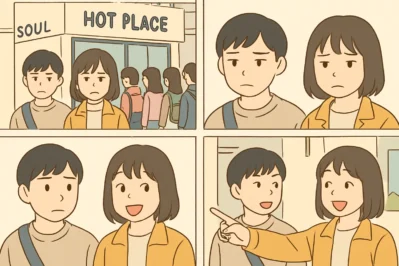Hello, everyone! Welcome to Maeil Hangul, where we upgrade your Korean skills one day at a time!
Have you ever seen a super cool café on Instagram, rushed to visit it in Seoul, only to find a huge line of people waiting outside? It happens all the time! Today, we’re going to learn how to handle this exact situation like a pro.
You see, lately in Korea, everyone is obsessed with finding the “핫플 (hot-peul),” or “hot place.” These are the trendiest, most photogenic restaurants, cafes, and shops. But with popularity comes crowds! So, what do you say to your friend when your Plan A is too busy? Let’s learn how to suggest going to another spot!
Key Expressions You Need to Know!
Here are some simple but super useful phrases for when you need to change plans.
- 한국어 표현: 여기는 사람이 너무 많아요.
- 발음 [로마자]: Yeogi-neun saram-i neomu man-ayo.
- 영어 뜻: There are too many people here.
- 상세 설명: This is the perfect sentence to explain why you want to leave. 여기 (yeogi) means “here,” 사람 (saram) means “person/people,” and 너무 많아요 (neomu man-ayo) means “there are too many.” You can use this in any crowded place, like a subway station, a store, or a popular tourist spot. It’s a polite and clear way to state the problem.
-
한국어 표현: 다른 데
- 발음 [로마자]: Dareun de
- 영어 뜻: Another place / somewhere else
-
상세 설명: This is your magic phrase! 다른 (dareun) means “different” or “other,” and 데 (de) means “place.” Put them together, and you have the key to suggesting a new destination. It’s short, easy, and incredibly common in daily conversation.
-
한국어 표현: -ㄹ/을까요? (갈까요?)
- 발음 [로마자]: -l/eulkkayo? (galkkayo?)
- 영어 뜻: Shall we…? (Shall we go?)
- 상세 설명: This is a gentle and friendly way to make a suggestion. You attach it to a verb stem. For the verb 가다 (gada – to go), you take the stem 가 (ga) and add -ㄹ까요? to get 갈까요? (galkkayo?) – “Shall we go?”. It’s much softer than saying “Let’s go!” and invites your friend’s opinion.
Example Dialogue: The “Hot Place” Hunt
Let’s see how these expressions work in a real-life conversation. Imagine two friends, A and B, arriving at a famous café they saw on social media.
A: 와! 이 카페 예쁘다! 근데… 여기는 사람이 너무 많아요.
(Wa! I kape yeppeuda! Geunde… yeogi-neun saram-i neomu man-ayo.)
(Wow! This cafe is pretty! But… there are too many people here.)
B: 맞아요. 우리 다른 데 갈까요?
(Maj-ayo. Uri dareun de galkkayo?)
(You’re right. Shall we go somewhere else?)
A: 좋아요! 근처에 다른 카페가 있어요. 거기에 가요!
(Jo-ayo! Geuncheo-e dareun kape-ga iss-eoyo. Geogi-e gayo!)
(Okay! There’s another cafe nearby. Let’s go there!)
See how natural that sounds? You’re now ready to navigate the busy streets of Seoul!
Culture Tip: Understanding Korea’s “핫플 (Hot Place)” Culture
To truly sound like a local, you need to understand the culture behind the language.
The term “핫플 (hot-peul)” is a Korean-style English abbreviation of “hot place.” Koreans, especially the younger generation, love discovering these trendy spots. They often find them through Instagram, Naver blogs, or recommendations from friends.
Waiting in line, called “웨이팅 (waiting),” is a very normal part of the “hot-peul” experience. Sometimes, waiting 30 minutes or even an hour is considered worth it!
However, knowing when to say “다른 데 갈까요? (Dareun de galkkayo?)” is a valuable social skill. It shows you value your time and are flexible. Suggesting a “Plan B” is super common, so don’t be shy! When you use this phrase, you’re not just speaking Korean; you’re participating in modern Korean social culture.
Let’s Review and Practice!
Great job today! We learned how to identify a problem (사람이 너무 많아요), suggest an alternative (다른 데), and do it politely (-갈까요?).
Now, it’s your turn to practice!
Quick Quiz:
You and your friend arrive at a famous restaurant that a K-Pop idol recommended, but the line is incredibly long. How would you suggest going somewhere else?
“우와, 사람이 정말 많네요. 우리 _________?”
(Uwa, saram-i jeongmal manneyo. Uri _________?)
(Wow, there are so many people. Shall we _________?)
Fill in the blank with the phrase we learned today!
Leave your answer in the comments below using the expressions we learned today. I can’t wait to see your sentences! Keep up the amazing work, and see you next time at Maeil Hangul






